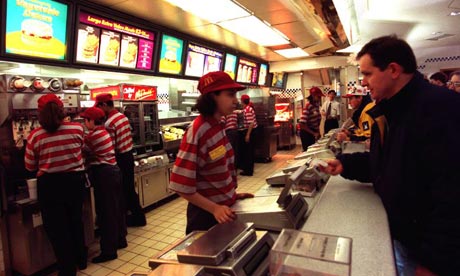When I moved to London a year ago, among my priorities was finding good cafes; I spend a lot of time working and writing in them.
While I never had to look far for decent coffee, finding good customer service was a little harder.
So it was with pleasant surprise that I discovered two places: the coffee shop in Foyles bookshop in London, where I am on first name terms with my favourite member of staff, and a European import, Joe and the Juice on Oxford Circus, which, for me, has been the best example of good customer service: they knew my order after one visit, they smile at everyone, they’re friendly and joke with you. But best of all, the first time I ever went in one of them smiled and said “Hey! How are you?” as if he I an old friend he hadn’t seen in years.
In neither of these cases is the coffee much different from anywhere else, and both are well over two miles walk from my flat (while the nearest cafe is 50 metres) yet I still visit both regularly and champion them to anyone who is willing to listen: and that’s all down to their customer service.
Those of you already in jobs or familiar with the way HR tends to work in larger organisations will have come across the term ‘competencies’, under which customer service tends to hide under different names. In project management it’s called “stakeholder management” and in advertising or consultancy it’s the “client experience”, but whatever the name it is still customer service.
It’s frequently said that the area candidates are lacking in most is soft skills, and I like to argue that the vast majority of competencies relate to soft skills and, in turn, soft skills is often just a byword for customer service.
Let’s take a brief look at PwC, the firm has 10 global core competencies on which it assesses graduate candidates. Eight out of the 10 competencies relate in some way to other people, whether it’s focusing on the client experience (the most obvious parallel to customer service) or just coaching others. I’d argue that it’s easier to coach someone else if you provide good service to them and thereby gain their trust first.
Customer service is integral to the entire lifecycle of job-hunting. When first job seeking it helps to decide quite how good we are at providing good customer service. There is absolutely nothing to feel bad about if we don’t like dealing with other people and no shortage of occupations to choose that minimise customer or client contact, but if we want to be involved in industries such as IT, finance, consulting and media then these skills are essential.
If you consider your ability to serve a customer to be poor, then go to shops, cafes and restaurants and observe the staff. Try to discover what it is you like about the good service you see as you’re much more likely to learn from observation than reading (and please share your examples in the comments too).
Even when writing your CV you can focus on servicing the customer, who in this case is the recruiter. The reason you should keep your CV to two pages and at a reasonable font size, with lots of white space, is because it makes the experience of reading your CV easier. Similarly the content should be targeted along the lines of what the recruiter wants to read, and you should also be writing examples of when you’ve delivered work to a customer: even if the work was a dissertation and the customer your supervisor.
Then, when at interview, take a lesson from my favourite coffee shop. Remember that your interviewer is a human being with emotions too. Smile at them genuinely. Forget your fear. Ask yourself what you can do for them and their company. And be authentic to your own personality – most of us would rather hire an imperfect human being we can enjoy working with than a perfect robot who will fail to connect with our customers and clients.










